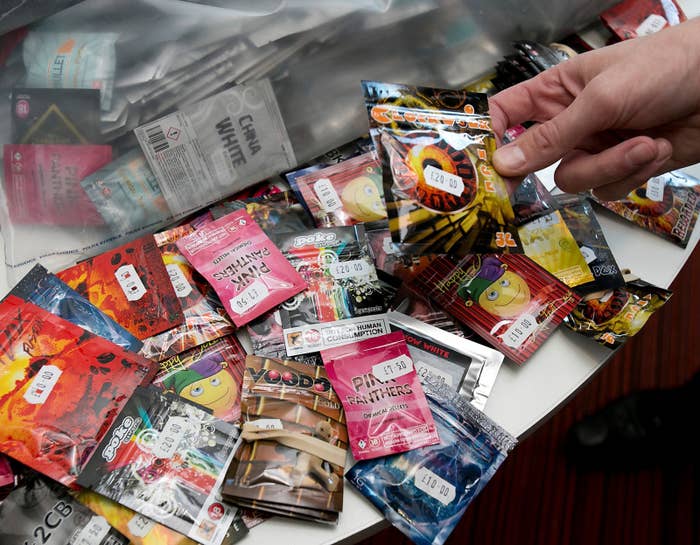
Prisoners are killing themselves after suffering psychotic episodes as a result of taking new psychoactive substances (NPSs), according to the prisons and probation ombudsman.
Nigel Newcomen told the House of Lords' All-Party Parliamentary Group on Penal Affairs on Tuesday that the deaths of at least 79 prisoners have been linked to NPSs, such as the cannabis-like substance spice. He said that 56 of those deaths were self-inflicted.
In May 2016, Newcomen said that 39 prisoners had died or killed themselves as a result of taking NPSs in the two years to June 2015, meaning that there were 40 deaths in the following year.
He told peers that the problem was exacerbated by inmates' mental health problems, and that the prison system was still in crisis.
The health risk to prisoners is such that guides on how to safely take NPSs have been distributed. One such guide, seen by BuzzFeed News, said: "If you snort, chop powders finely first. Don't inject but if you do, don't share works [needles] with other people."

The guide recommends that prisoners don't take the drugs while alone, and shows how to put someone in the recovery position.
Newcomen said:
As well as mental ill-health, another contributory factor to the increase in suicide in prison is the epidemic of new psychoactive substances.
My researchers have now identified 79 deaths between June 2013 and September 2016 where the deceased was known or strongly suspected to have taken NPS before death or where their NPS use was a key issue during their time in prison. Of these investigations, 56 were self-inflicted deaths.
Establishing direct causal links between NPS and the death is not easy, but my investigations identified a number of cases where my clinical reviewers considered that NPS led to psychotic episodes which resulted in self-harm. In other cases, NPS led to bullying and debt of the vulnerable, also resulting in self-harm.
NPS is a scourge in prison, which I have described as a 'game-changer' for prison safety. Reducing both their supply and demand for them is essential.
However, Newcomen cautioned that neither poor mental health, nor the wide availability of NPSs, could entirely explain the rise in prison suicides, and that a safety net of suicide prevention was essential.
"Unfortunately, too often my investigations identify repeated failings in prison suicide prevention procedures,” he added.
NPSs, previously known as legal highs, were banned in May this year when the Psychoactive Substances Act came into force. While their sale is illegal, possession is not a crime except in jails, where they are specifically outlawed.
Penal reform charities have spoken of an NPS "epidemic" in prisons, while prison staff have reported an increase in violence and ambulance call-outs as a direct result.
In February, Darren Rawlinson, 38, was found dead in his cell at Forest Bank prison in Salford, which is run by outsourcing firm Sodexo. He had recently told his sister that fellow inmates high on spice were regularly carried out of their cells. His death is under investigation.
Peter Dawson, director of the Prison Reform Trust, said in response to the figures: "The ombudsman’s findings underline the urgency of implementing a balanced and comprehensive strategy to reduce drug use in prisons.
"The government has rightly invested heavily in supply reduction. But these findings show why it must also invest in reducing demand. Above all, that means keeping vulnerable people out of prison in the first place. For those who have committed serious crime for which only prison will do, it means a way of life inside which is constructive and offers hope for the future—not endless tedious hours behind a cell door."
Prisons minister Sam Gyimah said in an emailed statement:
The current level of drugs in our prisons is absolutely unacceptable – causing untold mental and physical damage to prisoners, fuelling violence against staff, and jeopardising important reforms to transform prisons into places of reform and rehabilitation.
As the ombudsman has rightly said, psychoactive substances in our prisons is a ‘game changer’, and that’s why we have put in place a range of measures to stop the flow of dangerous substances, which together have seen 225kg of illicit drugs recovered from prisons in 2016 alone.
This includes mandatory testing for psychoactive substances; the training of over 300 specialist drug dogs; and the introduction of tough new laws to punish those who smuggle drugs into prisons.
However, these issues within our prisons will not be resolved overnight and we must do more. That’s why we’re recruiting an extra 2,500 frontline officers to boost safety and reform, and putting more funding into prison safety to address the increase of self-harm and suicides in our prisons.
